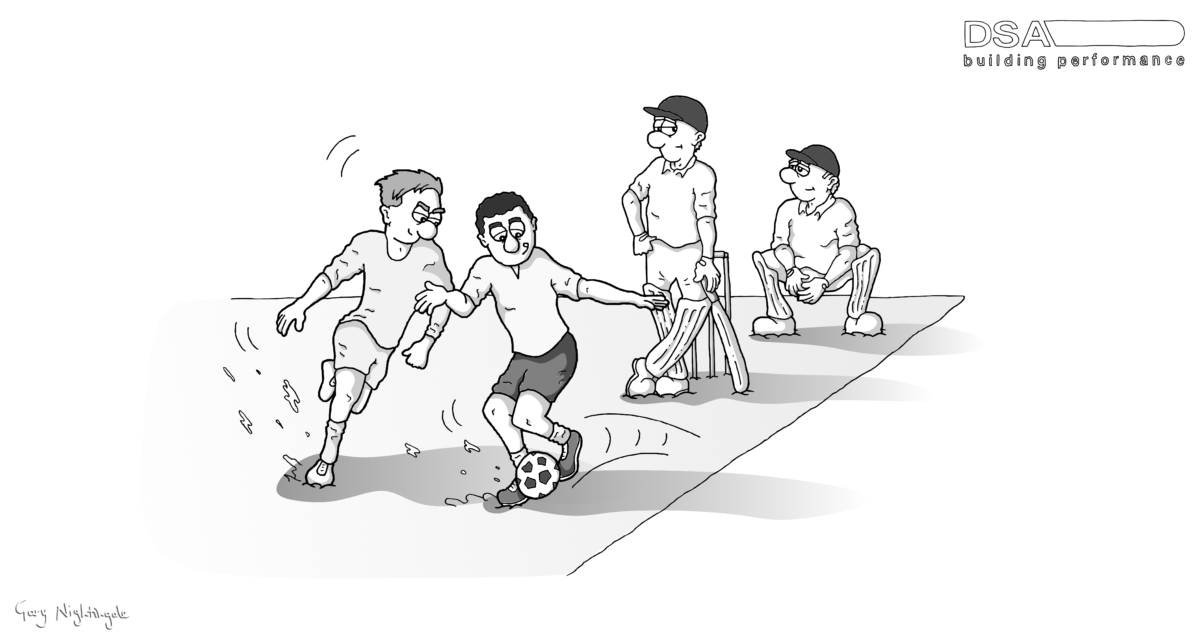If you want to be game-changing, change the game

There is a hard way to change an organisation, and there’s an easy way, although the easy way may take years to master.
An eight-stone black belt can easily throw someone twice as big. She knows the leverage point at which to push with modest force, and once sixteen stone starts moving with gravity, it moves very quickly. She trained and practiced for years to become a black belt; it’s unlikely a novice will achieve the same result.
Similarly, leaders and managers can deliver huge business results providing they push the right levers. But what are the right levers? In living systems – teams, organisations, joint ventures – there is a hierarchy of levers.
The hierarchy of levers
At the lower end are what we call ‘the elements’. Then comes ‘interactions’. At the top of the hierarchy is ‘purpose’.
The elements include people. Change a few people around and it doesn’t really change the system. Your brightest star may light things up for a while but, in my experience, the system will soon pull them down to the common level. (There is an exception to this, which we’ll come to.)
The next level up are the interactions between the elements. Interactions include: rules of the game, policies and procedures, how people are recruited, developed and retained, the relationships, conversations and social norms. Modifying interactions can have a significant effect on the system.
At the top end of this simple systems hierarchy is purpose or goals or vision. A change in purpose changes the system profoundly. Let me try and explain this with an example.
Different players, same team
A football team has 11 players on the pitch. Change a few players and it might make a difference to a match, although less so over the season. A substitute may score with their first kick and win the game, but over a few years of, say, five tournaments, I suspect the difference will be marginal.
In fact, you can change all 11 players and it’s still a football team: the system has not changed. Any football fan will tell of the star player who cost a fortune but who fell short of expectations and then got transferred to another team (system) and recaptured their mojo.
Now look at the interactions at the football club: the culture, how players are recruited and developed from an early age, the academy, the way they are managed, the policies or rules of the club, the team ethic, relationships and conversations on and off the pitch. Changes at this level can significantly impact the system and its results. I am thinking of Barcelona Total Football, although even at this level it’s still football.
At the purpose level if you change the goal from winning the Champions League to winning the Cricket World Cup you totally change the system. Everything changes, the players, the pitch the facilities, how the players are recruited and developed, the rules of the game. Everything.
A change in purpose changes the system profoundly; this is the leader’s most powerful lever for change. If people in the system, team or organisation are wondering ‘What’s the point of this?’ or worse, ‘Why bother?’, then it’s going to be the hard way.
To what extent are you applying your levers?
‘We’re not playing football anymore’
Years ago I was involved in an organisational change programme where some middle managers were thought to be blocking progress (a seemingly common dynamic).
The leader got all middle managers in a room, over a hundred people, and explained how the old way compared to a game of football.
‘We are now playing the game of cricket’, he went on to say, ‘and can you imagine how disruptive to our game of cricket it is to have footballers running back and forth across the wicket? It’s ridiculous. Football is a fine and honourable game and if you really want to continue playing football then join a football team, this is now a cricket team’.
The company had changed its purpose and that had changed everything.
There is an exception to this hierarchy. The leader of the team or the board of directors of an organisation are ‘elements’ (lowest-level system levers), but they can change the purpose (highest level) so they have huge leverage.
That is where I work, because it’s where I can make the biggest difference – helping leaders get clear on purpose and then moving that purpose outwards so that everyone and everything is ‘on purpose’.
That’s the easy way, ‘on purpose’, although the changes to elements and interactions can take years, so be wary of novices promising quick turnarounds. Also becoming a systems black belt takes years to master; 20 years in and I think I have started.
